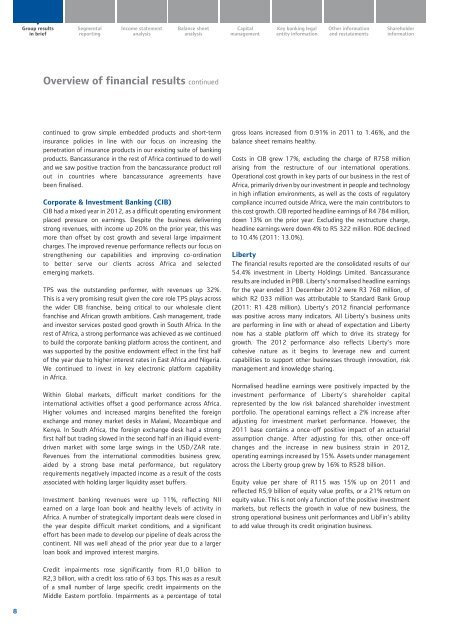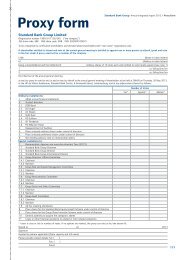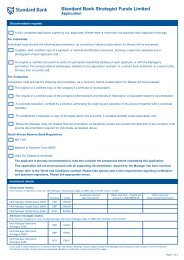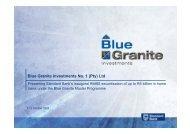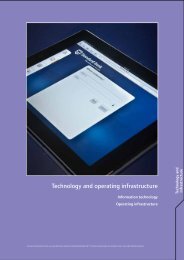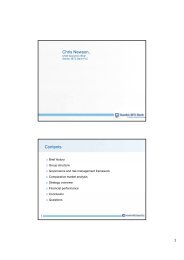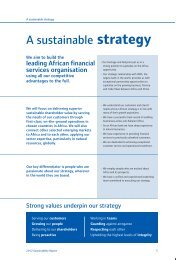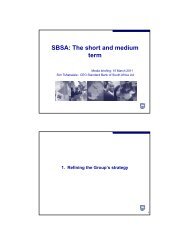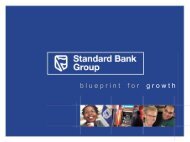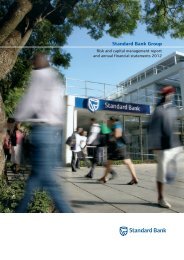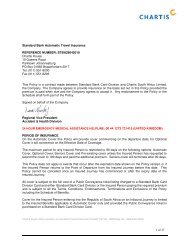Standardbank Cover.indd - Standard Bank - Investor Relations
Standardbank Cover.indd - Standard Bank - Investor Relations
Standardbank Cover.indd - Standard Bank - Investor Relations
You also want an ePaper? Increase the reach of your titles
YUMPU automatically turns print PDFs into web optimized ePapers that Google loves.
Group results<br />
in brief<br />
Segmental<br />
reporting<br />
Income statement<br />
analysis<br />
Balance sheet<br />
analysis<br />
Capital<br />
management<br />
Key banking legal<br />
entity information<br />
Other information<br />
and restatements<br />
Shareholder<br />
information<br />
Overview of financial results continued<br />
continued to grow simple embedded products and short-term<br />
insurance policies in line with our focus on increasing the<br />
penetration of insurance products in our existing suite of banking<br />
products. Bancassurance in the rest of Africa continued to do well<br />
and we saw positive traction from the bancassurance product roll<br />
out in countries where bancassurance agreements have<br />
been finalised.<br />
Corporate & Investment <strong>Bank</strong>ing (CIB)<br />
CIB had a mixed year in 2012, as a difficult operating environment<br />
placed pressure on earnings. Despite the business delivering<br />
strong revenues, with income up 20% on the prior year, this was<br />
more than offset by cost growth and several large impairment<br />
charges. The improved revenue performance reflects our focus on<br />
strengthening our capabilities and improving co-ordination<br />
to better serve our clients across Africa and selected<br />
emerging markets.<br />
TPS was the outstanding performer, with revenues up 32%.<br />
This is a very promising result given the core role TPS plays across<br />
the wider CIB franchise, being critical to our wholesale client<br />
franchise and African growth ambitions. Cash management, trade<br />
and investor services posted good growth in South Africa. In the<br />
rest of Africa, a strong performance was achieved as we continued<br />
to build the corporate banking platform across the continent, and<br />
was supported by the positive endowment effect in the first half<br />
of the year due to higher interest rates in East Africa and Nigeria.<br />
We continued to invest in key electronic platform capability<br />
in Africa.<br />
Within Global markets, difficult market conditions for the<br />
international activities offset a good performance across Africa.<br />
Higher volumes and increased margins benefited the foreign<br />
exchange and money market desks in Malawi, Mozambique and<br />
Kenya. In South Africa, the foreign exchange desk had a strong<br />
first half but trading slowed in the second half in an illiquid eventdriven<br />
market with some large swings in the USD/ZAR rate.<br />
Revenues from the international commodities business grew,<br />
aided by a strong base metal performance, but regulatory<br />
requirements negatively impacted income as a result of the costs<br />
associated with holding larger liquidity asset buffers.<br />
Investment banking revenues were up 11%, reflecting NII<br />
earned on a large loan book and healthy levels of activity in<br />
Africa. A number of strategically important deals were closed in<br />
the year despite difficult market conditions, and a significant<br />
effort has been made to develop our pipeline of deals across the<br />
continent. NII was well ahead of the prior year due to a larger<br />
loan book and improved interest margins.<br />
gross loans increased from 0.91% in 2011 to 1.46%, and the<br />
balance sheet remains healthy.<br />
Costs in CIB grew 17%, excluding the charge of R758 million<br />
arising from the restructure of our international operations.<br />
Operational cost growth in key parts of our business in the rest of<br />
Africa, primarily driven by our investment in people and technology<br />
in high inflation environments, as well as the costs of regulatory<br />
compliance incurred outside Africa, were the main contributors to<br />
this cost growth. CIB reported headline earnings of R4 784 million,<br />
down 13% on the prior year. Excluding the restructure charge,<br />
headline earnings were down 4% to R5 322 million. ROE declined<br />
to 10.4% (2011: 13.0%).<br />
Liberty<br />
The financial results reported are the consolidated results of our<br />
54.4% investment in Liberty Holdings Limited. Bancassurance<br />
results are included in PBB. Liberty’s normalised headline earnings<br />
for the year ended 31 December 2012 were R3 768 million, of<br />
which R2 033 million was attributable to <strong>Standard</strong> <strong>Bank</strong> Group<br />
(2011: R1 428 million). Liberty’s 2012 financial performance<br />
was positive across many indicators. All Liberty’s business units<br />
are performing in line with or ahead of expectation and Liberty<br />
now has a stable platform off which to drive its strategy for<br />
growth. The 2012 performance also reflects Liberty’s more<br />
cohesive nature as it begins to leverage new and current<br />
capabilities to support other businesses through innovation, risk<br />
management and knowledge sharing.<br />
Normalised headline earnings were positively impacted by the<br />
investment performance of Liberty’s shareholder capital<br />
represented by the low risk balanced shareholder investment<br />
portfolio. The operational earnings reflect a 2% increase after<br />
adjusting for investment market performance. However, the<br />
2011 base contains a once-off positive impact of an actuarial<br />
assumption change. After adjusting for this, other once-off<br />
changes and the increase in new business strain in 2012,<br />
operating earnings increased by 15%. Assets under management<br />
across the Liberty group grew by 16% to R528 billion.<br />
Equity value per share of R115 was 15% up on 2011 and<br />
reflected R5,9 billion of equity value profits, or a 21% return on<br />
equity value. This is not only a function of the positive investment<br />
markets, but reflects the growth in value of new business, the<br />
strong operational business unit performances and LibFin’s ability<br />
to add value through its credit origination business.<br />
Credit impairments rose significantly from R1,0 billion to<br />
R2,3 billion, with a credit loss ratio of 63 bps. This was as a result<br />
of a small number of large specific credit impairments on the<br />
Middle Eastern portfolio. Impairments as a percentage of total<br />
8


